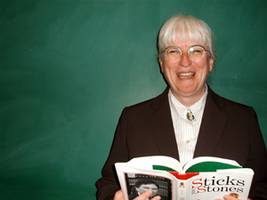

A passion for teaching and a commitment to her students earned Professor Judy Brown, who teaches in the Dept. of English, Canada’s top teaching award.
Teaching always felt like the right thing to do, says Brown, recently recognized with a 3M National Teaching Fellowship
Brown, who started at UBC as a teaching assistant in 1978, was one of 10 professors honoured with a 2007 3M National Teaching Fellowship . The award, created by technology giant 3M Canada and the Society for Teaching and Learning in Higher Education (STLHE), recognizes excellence in teaching and educational leadership.
Professor Harry Hubball of Curriculum Studies is a fellow recipient, making UBC one of only two universities in Canada to have two teachers designated in 2007. The 2007 3M Fellows joined a community of more than 200 to receive the honour since its inception in 1986.
Brown teaches Canadian and children’s literature as well as first-year English, an online course in technical writing, and Writing Centre courses focused on ethical and effective tutoring.
A popular thesis advisor in the interdisciplinary MA Program in Children’s Literature, she is also a mentor to students in Arts Co-op.
Her classes, ranging from seminars to large lectures, are popular among UBC students — they are always full, complete with waiting lists.
An associate editor at Canadian Literature, the leading journal for new research and writing in its field, Brown is also involved with the UBC/Vancouver School Board Transition Program for Gifted Students. In addition, she has co-authored writing handbooks used throughout Canada.
Above all, Brown says teaching always felt like the right thing to do with her life.
“If you’re looking for a life where you’re always going to be stretched, challenged, surprised, and inspired by your students, or at least be open to being inspired by your students, then this is a really good life to choose.”
As part of the selection process for the 3M Fellowship, contenders were asked to describe their teaching philosophy.
“Teach is a wonderful little verb,” Brown wrote. “Sharp-sounding and monosyllabic, it has the ring of integrity about it. Under siege in these times by wordsmiths who prefer those more fine-sounding synonyms and euphemisms — facilitation, pontificate, lecture, hold forth — the word ‘teach’ stands its ground.
“I teach, and proudly so.”
Known for the encouraging classroom atmosphere she creates, Brown says student insights through the years have impacted her thinking.
“When you go into a classroom, you have this nice, big, open, diverse audience that can react to the things that you’re saying and ask you questions and take you places that you haven’t thought of going before,” she says.
She believes it is key for teachers to appreciate the contributions of their students.
“You have to find a way, and I think you need to find it as early as possible in your teaching career, of communicating to students that you respect their efforts and understand how much they’ve put into a project,” she says.
“If you dismiss someone’s writing, you never get a second chance as a teacher.”
In fact, it is the very ideas that students bring to the classroom that can enrich teaching and learning, she notes.
“I’ve learned that when I go into my classes, I’m going to learn a huge amount from my students because of what they bring to the table,” Brown says. “If you’re teaching a lot of multicultural Canadian literature, for example, students can bring their experiences to the classroom, or their linguistic background, or their knowledge of story, or their knowledge of elders.”
Brown is also a past recipient of the UBC Killam Teaching Prize (2003-04), and the Margaret Fullton Award (1999-00).
She credits her teaching style to what she calls a “line of inheritance.”
“I think everyone who has been teaching for a while realizes that you try to teach in a way that you can remember being taught by the best of your teachers,” she says.
Reflecting on the importance of the teacher as a reading audience for students’ writing, she asks: “When were you most excited about your writing? When you had an audience that was responsive. Even when your reader was critical, he or she would say, ‘This is really interesting — here is where you could go further,’ or ‘I haven’t really thought of that before — you’ve given me new insight.’”
At the beginning of each term, Brown tells students it is their questions, insights, and comments that make her classes exciting.
“When students can bring questions, or send me questions quietly by email, if they’re a little bit shy, and they can get me thinking in a way that I haven’t thought of before — when there’s that really strong interaction between the student and instructor, I think that’s when the class is going to work.”
Since becoming a full-time instructor in 1980, Brown has earned herself a lasting reputation among students. Word-of-mouth recommendations rank high when registering for her courses.
“I’ve had students who have said, ‘My brother, or sister was in your class a few years ago,’ or ‘A friend was in your class a few years ago and said that I should take it.’ It’s really nice to see that happen.”
“Although, I’ve never had a student who has said, ‘You’ve taught my mom or my dad.’ That hasn’t happened yet,” she says, laughing.


